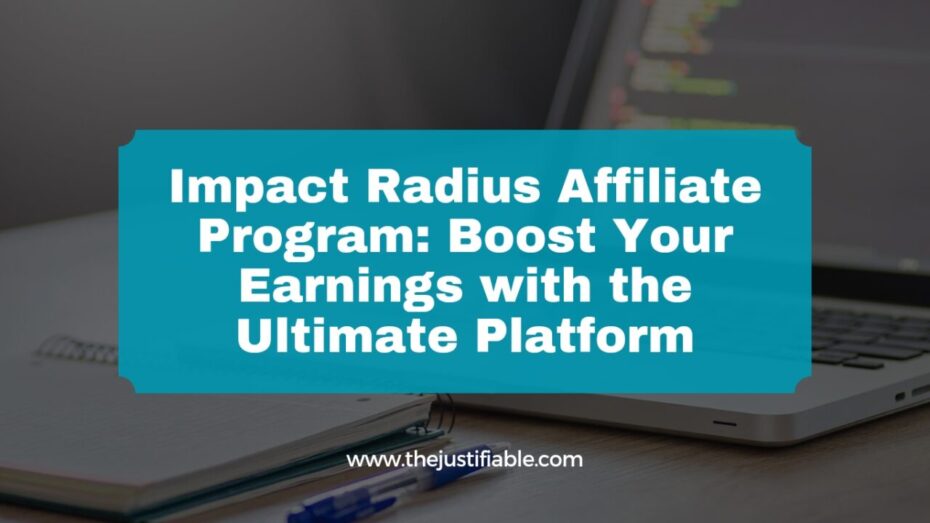Table of Contents
Impact radius affiliate program!
What is Impact Radius?
Impact Radius is a cutting-edge, technology-driven affiliate marketing platform designed to empower businesses and affiliates alike.
This powerful platform provides users with advanced tools and features to create, manage, and optimize their affiliate programs efficiently. Founded in 2008, Impact Radius has established itself as a global leader in the affiliate marketing industry by combining innovative technology with a user-friendly interface.
At its core, Impact Radius focuses on providing an end-to-end solution for managing and scaling performance-based partnerships. With a data-driven approach, the platform helps advertisers and affiliates make informed decisions and optimize their marketing efforts.
Impact Radius supports a wide range of partnership types, including traditional affiliates, influencers, strategic partners, and more. Its comprehensive suite of tools, analytics, and automation capabilities ensure that users can efficiently manage their partnerships, track performance, and drive growth.
Benefits of Impact Radius Affiliate Program
There are numerous benefits to joining the Impact Radius Affiliate Program, making it an attractive choice for both advertisers and affiliates. Here are some of the key advantages that set it apart from other affiliate networks:
- Robust Tracking and Attribution: Impact Radius offers industry-leading tracking technology that ensures accurate attribution of conversions and commissions. With its advanced tracking capabilities, users can gain valuable insights into the performance of their campaigns and make data-driven decisions to optimize their strategies.
- Flexible Commission Structures: Impact Radius supports various commission structures, including pay-per-sale, pay-per-lead, and pay-per-click. This flexibility allows advertisers to create customized affiliate programs tailored to their specific goals and objectives, while affiliates can choose the programs that align with their marketing efforts and audience preferences.
- Comprehensive Reporting and Analytics: Impact Radius provides users with a wealth of data and reporting options, enabling them to monitor their campaigns’ performance and make informed decisions based on real-time insights. The platform’s user-friendly dashboard offers a comprehensive overview of essential metrics, while its advanced reporting features allow for in-depth analysis and data segmentation.
- Global Reach: With its vast network of advertisers and affiliates, Impact Radius offers a global reach that enables users to tap into new markets and expand their reach. The platform supports multiple languages, currencies, and payment methods, ensuring a seamless experience for both advertisers and affiliates across different regions.
- High-Quality Partnerships: Impact Radius prides itself on fostering high-quality partnerships between advertisers and affiliates. The platform’s rigorous vetting process ensures that only reliable and reputable partners are accepted, which helps maintain trust and credibility within the network.
- Dedicated Support and Resources: Impact Radius offers extensive resources and dedicated support to help users succeed in their affiliate marketing endeavors. From informative guides and webinars to personalized account management, users can access the assistance and resources they need to optimize their campaigns and drive growth.
Getting Started with Impact Radius
Account Creation
To begin your journey with the Impact Radius affiliate platform, the first step is to create an account. The account creation process is straightforward and user-friendly. To start, visit the Impact Radius website and click on the “Sign Up” button. You’ll be prompted to provide some basic personal and professional information, such as your name, email address, company name, and website URL.
It’s essential to provide accurate and up-to-date information to ensure a smooth onboarding process. During the registration process, you’ll also be asked to choose a username and password. Be sure to select a secure password that you can easily remember, as you’ll need it to log into the platform and access your account.
Once you’ve completed the registration form, you’ll receive an email with a confirmation link. Click on the link to verify your email address and complete the account creation process. After your account is confirmed, you’ll be able to access the Impact Radius dashboard and start exploring the platform’s features and tools.
Choosing an Affiliate Program
Once your account is set up, the next step is to choose an affiliate program that aligns with your marketing goals and audience preferences. Impact Radius offers a vast network of advertisers and programs, catering to various industries and niches. To find the right fit, you’ll need to consider factors such as the products or services you want to promote, the commission structure, and the advertiser’s reputation.
To start your search, navigate to the “Advertiser Marketplace” section of the Impact Radius platform. Here, you can browse through the available programs by category, keyword, or other filters. Take the time to research and compare different programs to identify the ones that best align with your objectives and audience.
When evaluating potential programs, pay attention to factors such as the average commission rate, conversion rate, and EPC (earnings per click). These metrics can provide valuable insights into the program’s performance and potential profitability.
Approval Process
After selecting an affiliate program that meets your criteria, the next step is to apply for approval. The approval process varies depending on the advertiser’s specific requirements and guidelines. Some programs may accept affiliates automatically, while others may require manual approval and additional information.
To apply for an affiliate program, click on the “Apply” button within the program’s listing. You may be prompted to provide additional information, such as a brief description of your marketing strategy or your experience in the industry. Be thorough and professional in your responses, as this information will be used to evaluate your suitability for the program.
Once your application has been submitted, you’ll need to wait for the advertiser to review your application and make a decision. The waiting period can vary, ranging from a few hours to several days, depending on the advertiser’s review process. If your application is approved, you’ll receive a notification and gain access to the program’s promotional materials, tracking links, and other resources.
In conclusion, getting started with Impact Radius is a straightforward process that involves creating an account, choosing an affiliate program, and navigating the approval process. By carefully selecting programs that align with your marketing goals and audience, you can set yourself up for success in the competitive world of affiliate marketing.
Commission Structures
Understanding the different commission structures available in the Impact Radius Affiliate Program is crucial to maximizing your earnings and optimizing your marketing strategies. Each commission structure rewards affiliates based on specific actions taken by their referred customers.
By familiarizing yourself with these commission models, you can choose the most suitable programs for your audience and marketing goals. In this section, we will discuss three common commission structures: pay-per-sale, pay-per-lead, and pay-per-click.
Pay-Per-Sale
Pay-per-sale, also known as cost-per-sale or revenue sharing, is one of the most prevalent commission structures in the affiliate marketing industry. Under this model, affiliates earn a commission for every sale they generate for the advertiser. The commission can be a fixed amount or a percentage of the total sale value, depending on the advertiser’s terms and conditions.
Pay-per-sale programs can be highly lucrative for affiliates, as they often offer higher commission rates compared to other structures. To succeed in this model, affiliates need to focus on driving high-quality traffic that is likely to convert into paying customers. This may involve creating targeted content, utilizing email marketing campaigns, or leveraging social media platforms to reach potential buyers.
Pay-Per-Lead
Pay-per-lead, also known as cost-per-lead, rewards affiliates for generating leads for the advertiser. In this commission structure, affiliates receive a fixed commission for every qualified lead they generate. A lead typically refers to a user who completes a specific action, such as signing up for a newsletter, registering for a free trial, or filling out a contact form.
Pay-per-lead programs can be appealing to affiliates, as they do not require the referred user to make a purchase to earn a commission. This commission structure is particularly popular in industries where the sales cycle is longer or more complex, such as financial services, insurance, or software. To thrive in pay-per-lead programs, affiliates should focus on driving targeted traffic and optimizing their conversion rates to generate high-quality leads for the advertiser.
Pay-Per-Click
Pay-per-click, also known as cost-per-click, is a commission structure that compensates affiliates for driving traffic to the advertiser’s website. Under this model, affiliates earn a commission for every user who clicks on their referral link and visits the advertiser’s site. The commission is typically a fixed amount per click, regardless of whether the user completes a purchase or other action.
While pay-per-click programs can be less common than pay-per-sale or pay-per-lead models, they can still be a viable option for certain affiliates and niches. This commission structure can be particularly suitable for affiliates with large audiences or high traffic volume, as they can generate revenue without relying on conversions or sales.
To succeed in pay-per-click programs, affiliates need to focus on driving high volumes of targeted traffic to the advertiser’s site and ensuring that their content aligns with the advertiser’s offerings.
Effective Affiliate Marketing Techniques
To succeed in the competitive landscape of affiliate marketing and maximize your commissions on the Impact Radius platform, it’s essential to employ effective marketing techniques. By leveraging proven strategies, you can drive targeted traffic, increase conversions, and ultimately boost your earnings.
In this section, we will discuss three powerful affiliate marketing techniques: content marketing, email marketing, and social media marketing.
Content Marketing
Content marketing is an essential strategy for affiliates looking to engage their audience, provide value, and drive conversions. By creating high-quality, relevant, and informative content, you can establish yourself as an authority in your niche, build trust with your audience, and encourage them to take action through your referral links.
To succeed in content marketing, focus on understanding your target audience’s needs, interests, and pain points. Then, create content that addresses these topics, such as blog posts, articles, videos, or infographics. Ensure that your content is well-structured, engaging, and optimized for search engines by incorporating relevant keywords and using proper formatting.
Additionally, consider incorporating product reviews, tutorials, or case studies into your content strategy, as these formats can be particularly effective at showcasing the benefits of the products or services you promote through Impact Radius.
Email Marketing
Email marketing is another powerful technique for affiliates looking to maximize their commissions on the Impact Radius platform. By building an email list and engaging your subscribers with targeted, relevant content, you can nurture relationships, drive repeat traffic, and increase conversions.
To get started with email marketing, consider offering an incentive for visitors to subscribe, such as a free guide, exclusive content, or a discount code. Once you have a list of subscribers, create engaging email campaigns that provide value and promote the products or services you’re affiliated with. Be sure to segment your list and personalize your emails to increase open rates and conversions.
Additionally, don’t forget to track your email marketing performance and make data-driven decisions to optimize your campaigns. This may involve testing different subject lines, email designs, or call-to-action buttons to find the most effective strategies for your audience.
Social Media Marketing
Social media marketing is a valuable tool for affiliates looking to expand their reach and drive targeted traffic to their Impact Radius promotions. By leveraging popular social media platforms such as Facebook, Instagram, Twitter, or Pinterest, you can connect with your target audience, share valuable content, and drive engagement with your affiliate offers.
To make the most of social media marketing, focus on building a strong presence on the platforms most relevant to your audience and niche. Share a mix of promotional and non-promotional content to maintain your followers’ interest and provide value. Engage with your followers by responding to comments, asking questions, and encouraging discussions.
Moreover, consider using social media advertising to reach a broader audience or target specific segments based on demographics, interests, or behaviors. By investing in paid advertising, you can increase your visibility, drive targeted traffic, and boost your Impact Radius affiliate commissions.
Keyword Research
Keyword research plays a pivotal role in the success of your affiliate marketing efforts on the Impact Radius platform. By identifying the right keywords to target in your content, you can drive organic traffic from search engines, connect with your target audience, and ultimately increase your conversions and commissions.
In this section, we will discuss the importance of keyword research, the tools you can use to conduct it, and the benefits of targeting long-tail keywords.
Importance of Keyword Research
Keyword research is the process of discovering and analyzing the search terms that users enter into search engines when looking for information, products, or services related to your niche. By understanding the keywords your target audience uses, you can optimize your content to rank higher in search engine results and attract more visitors to your website or blog.
The importance of keyword research cannot be overstated, as it forms the foundation of your search engine optimization (SEO) strategy. By targeting relevant, high-traffic keywords, you can increase your website’s visibility, drive organic traffic, and ultimately boost your affiliate commissions.
Additionally, keyword research can help you uncover content ideas, understand user intent, and identify potential gaps in the market that you can exploit to gain a competitive edge.
Tools for Keyword Research
There are several tools available to assist you in conducting keyword research and identifying the best keywords to target in your affiliate marketing efforts. Some of the most popular and effective keyword research tools include:
- Google Keyword Planner: A free tool provided by Google Ads, the Keyword Planner allows you to discover new keyword ideas, view search volume data, and estimate keyword competition levels.
- SEMrush: A comprehensive SEO tool, SEMrush offers a powerful keyword research feature that enables you to find high-traffic keywords, analyze competitor strategies, and gain insights into keyword difficulty and search intent.
- Ahrefs: Another popular SEO tool, Ahrefs provides a robust keyword research module that allows you to discover keyword ideas, view search volume data, and analyze keyword competition and ranking potential.
By leveraging these tools, you can identify high-value keywords to target in your content and develop an effective SEO strategy to maximize your affiliate marketing success.
Targeting Long-Tail Keywords
Long-tail keywords are longer, more specific search terms that typically have lower search volume and competition levels compared to shorter, more general keywords. Despite their lower search volume, long-tail keywords can be highly valuable for affiliates, as they often have higher conversion rates and are easier to rank for in search engine results.
Targeting long-tail keywords in your content can help you attract more targeted traffic, as users searching for these specific terms are typically further along in the buying cycle and more likely to convert. By focusing on long-tail keywords, you can drive high-quality traffic, increase your chances of ranking on the first page of search engine results, and ultimately boost your Impact Radius affiliate commissions.






